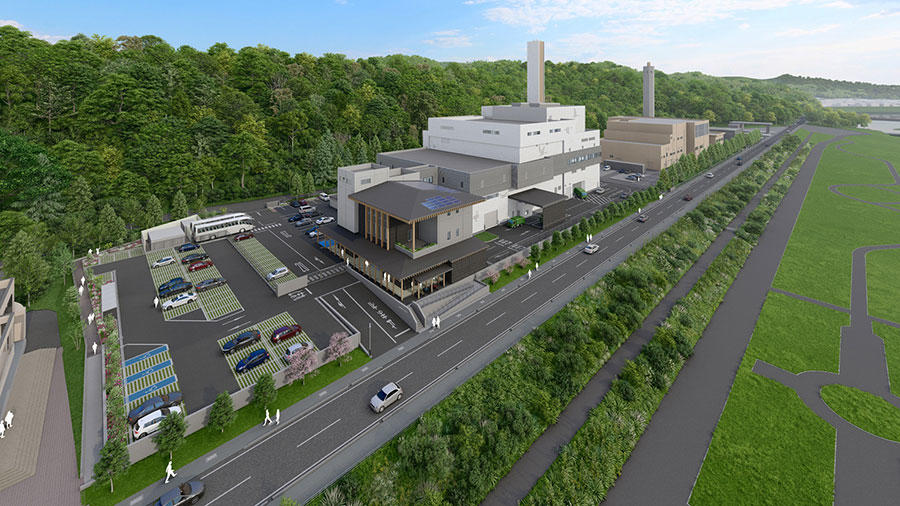Press Information
MHIEC Receives Order from Fukushima City to Rebuild Superannuated Waste-to-Energy Plant
-- Contract Also Includes Operation & Maintenance Services of New Facility for 20 Years --
-- Contract Also Includes Operation & Maintenance Services of New Facility for 20 Years --
・ Two stoker-type incinerators, which will replace the Abukuma Clean Center designed and constructed by Mitsubishi Heavy Industries, will provide waste processing capacity of 120 tpd
・ Lighter environmental footprint and enhanced generation efficiency will contribute to Fukushima's quest to become a "zero carbon city"

Conceptual drawing of the new Abukuma Clean Center after completion
Tokyo, October 2, 2023 - Mitsubishi Heavy Industries Environmental & Chemical Engineering Co., Ltd. (MHIEC), a Group company of Mitsubishi Heavy Industries, Ltd. (MHI), has received an order from the Fukushima Municipal Government to rebuild the city's Abukuma Clean Center Incineration Plant. The order calls for installation of two stoker-type incinerators(Note1) collectively capable of processing 120 tons per day (tpd), to replace the superannuated Abukuma Clean Center (240 tpd), originally designed and built by MHI and operated since 1988. Under the DBO(Note2) contract, MHIEC will also take charge of providing operation & maintenance services at the new plant for a period of 20 years. The contract is valued at 23.86 billion yen (tax excluded), with operation startup scheduled for April 2028.
The new facility will employ state-of-the-art technology for municipal waste processing. Besides the two stoker-type incinerators, each having a processing capacity of 60 tpd, the plant will have a lighter environmental footprint enabled by reduced CO2 emissions, and provide highly efficient power generation. The heat energy generated during waste processing will be used to supply power to a nearby recycling plant and the health facility, Healthyland Fukushima, which will also receive high-temperature water. These features will make for an environmentally friendly facility open to residents that will advance Fukushima's quest to be a "zero carbon city" achieving net zero greenhouse gas emissions by 2050.
Bidding for this project adopted a public proposal method, which took into consideration not only the bid price but also factors such as technological strengths and operating expertise. MHIEC's proposal was selected as a result of the following points that impressed the client: the adoption of a new local electric power source with a 100% renewable energy ratio by a local company to reduce CO2 emissions, the use of waste-derived construction materials in the building to save resources, the use of a wooden administration building to enhance the view seen by visitors and from prefectural roads, and consideration of the landscape of the surrounding forest and parks. In constructing and operating the facility, MHIEC will work closely with a group of three local companies in Fukushima City.
MHIEC succeeded to MHI's environmental protection business in 2008, taking over its accumulated technological development capabilities in environmental protection systems and abundant expertise in the construction and operation & maintenance of waste management facilities both in Japan and overseas. Based on this robust track record, the company is well positioned to propose comprehensive solutions encompassing all aspects from plant construction to operation & maintenance under DBO contract, and it can also respond to needs for after-sales servicing and maintenance. Going forward, MHIEC will continue to seek orders expansion worldwide through proactive offering of proposals for enhancing the efficiency of existing facilities, making incinerators more advanced through AI and IoT supported remote monitoring and automated operation, and lowering life-cycle costs (LCC).
- 1A stoker incinerator is the most widely adopted type of furnace used in waste-to-energy plants. Waste is combusted as it moves along on a fire grate made of heat-resistant castings.
- 2Under a DBO (design, build, operate) contract, a local agency or other public body procures necessary funding and entrusts a facility's design, construction and operation responsibilities to a private company while retaining its ownership.
About MHI Group
Mitsubishi Heavy Industries (MHI) Group is one of the world’s leading industrial groups, spanning energy, smart infrastructure, industrial machinery, aerospace and defense. MHI Group combines cutting-edge technology with deep experience to deliver innovative, integrated solutions that help to realize a carbon neutral world, improve the quality of life and ensure a safer world. For more information, please visit www.mhi.com or follow our insights and stories on spectra.mhi.com.




